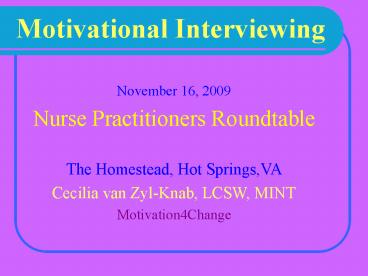Motivational Interviewing
1 / 24
Title:
Motivational Interviewing
Description:
That is, the counselor is one of the biggest determinants of client motivation ... Evoking vs. Imparting information. Docere - lead / impart knowledge or ... – PowerPoint PPT presentation
Number of Views:48
Avg rating:3.0/5.0
Title: Motivational Interviewing
1
Motivational Interviewing
November 16, 2009 Nurse Practitioners
Roundtable The Homestead, Hot Springs,VA Cecilia
van Zyl-Knab, LCSW, MINT Motivation4Change
2
You would think . . .
- that having had a heart attack would be enough to
persuade a man to quit smoking, change his diet,
exercise more, and take his medication - that hangovers, damaged relationships, an auto
crash, and memory blackouts would be enough to
convince a woman to stop drinking
3
And yet so often it is not enough What is the
Key?
4
Client Motivation is a Key to Change
- Substance abuse treatment outcomes are predicted
by - Pretreatment motivation measures
- Treatment attendance
- Treatment adherence/compliance
- Counselor ratings of motivation and prognosis
- That is, more motivated clients do better
5
And Client Motivation is Greatly Influenced by
the Counselor
- Clients motivation, retention and outcome vary
with the particular counselor to whom they are
assigned - Counselor style strongly drives client resistance
(confrontation drives it up, empathic listening
brings it down) - That is, the counselor is one of the biggest
determinants of client motivation and change
6
Readiness for What?
- Rather than asking Why isnt this person
motivated? - Ask What is this person motivated for?
- Potential Pitfall Assuming you know.
7
Denial
- Research specifically has not found overuse of
denial, or any other typical patterns of
defensive styles among people with SUDs
8
If its not personality, then what behaviors
cause counselors to perceive clients as being in
denial?
- Disagreeing with the counselor
- Resisting a diagnosis/label
- Declining help
- Showing little distress
- Disavowing a need for counseling or change
- Being non-compliant with treatment prescriptions
- Not changing
9
In contrast, counselors tend to perceive clients
as being motivated when they
- Agree with the counselor
- Accept the counselors diagnosis/label
- Express a desire for help
- Show distress
- Voice a need for the counselor/counseling
- Comply with the counselors treatment plan
- Change
10
In other words, client motivation is evident in
- Low resistance
- Openness and collaboration
- Expressing emotion
- Adhering to a change plan
- Changing
- All of which are strongly influenced, for better
or worse, by what the counselor does
11
Ambivalence
- The Dilemma of Change
12
Stages of ChangeProchaska DiClemente
13
Contemplation Stage
- It is easy to think that someone in this stage is
ready to make a change. - Work place smokers survey 70-80 contemplation,
but only 3-5 attracted to programs for change - Some studies Relationship between contemplation
higher levels of depression
14
Cognitive Behavioral Change
- Seems that cognitive and experiential processes
of change more important in earlier stages
(consciousness raising, self evaluation,
environmental re-evaluation) - Behavioral processes more important in later
stages of change (efficacy)
15
The Righting Reflex
16
You take one side I another
- When you strong argue one side, the ambivalent
naturally argue the other - The stronger the argument the less likely
change occurs
17
Common Human Reactions to the Righting Reflex
- Angry, agitated
- Oppositional
- Discounting
- Defensive
- Justifying
- Not understood
- Not heard
- Procrastinate
- ? Afraid
- ? Helpless, overwhelmed
- ? Ashamed
- ? Trapped
- ? Disengaged
- ? Dont come back avoid
- ? Uncomfortable
- ? Resistant
18
Common Human Reactions to Being Listened to
- Safe
- Empowered
- Hopeful
- Comfortable
- Interested
- Want to come back
- Cooperative
- Understood
- Want to talk more
- Liking the counselor
- Open
- Accepted
- Respected
- Engaged
- Able to change
19
A Change of Role
- You dont have to make change happen
- You cant
- You dont have to come up with all the answers
- You probably dont have the best ones
- Youre not wrestling
- Youre dancing
20
Motivational Interviewing Definition
- Motivational interviewing is
- a person-centered,
- directive
- method of communication
- for enhancing intrinsic motivation to change by
exploring and resolving ambivalence.
21
The Spirit of Motivational Interviewing
- Collaboration
- Evocation
- Docere and Ducere
- Autonomy
22
Docere and Ducere
- Two Latin verbs regarding education
- Evoking vs. Imparting information
- Docere - lead / impart knowledge or info
- Ducere - to draw forth or evoke from within
- Spirit of MI Ability to draw forth rather than
- pulling the client toward the goal
23
Thank You!
- Upcoming 2 Day Training Richmond, VA
- January 14 15, 2010 for more info visit
- Motivation4change.com
24
Reference List
- Miller, W. R., Rollnick, S. (2002). Motivational
Interviewing, Preparing People for Change. 2nd
Ed. Guilford Press.































![get [PDF] DOWNLOAD Motivational Interviewing in Nutrition an PowerPoint PPT Presentation](https://s3.amazonaws.com/images.powershow.com/10084661.th0.jpg?_=20240724077)